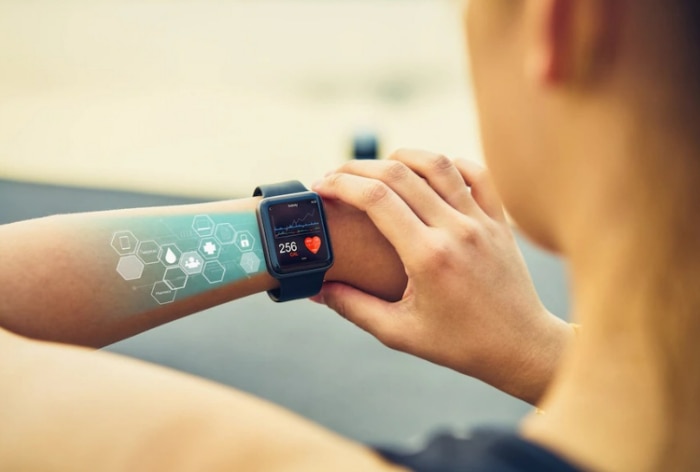Fitness trackers provide daily step count data and allow users to track progress towards daily or weekly step goals, as well as provide other measurements such as heart rate monitoring, sleep tracking, and body weight tracking

Consumer wearable fitness trackers offer opportunities and challenges for health practitioners in health promotion research. As the market for fitness trackers grows, interest in leveraging these devices to improve healthcare increases among researchers, clinicians, and fitness enthusiasts.
Fitness trackers primarily measure steps, which is a simple and easy-to-understand method for self-monitoring activity levels, especially for inactive individuals who rely on basic ambulatory activities. Step tracking is an approachable behavioral target for those who find exercise difficult, making it an effective way to introduce a positive habit of setting and achieving goals around physical activity. Fitness trackers provide daily step count data and allow users to track progress towards daily or weekly step goals, as well as provide other measurements such as heart rate monitoring, sleep tracking, and body weight tracking.
A GUIDE TO CHOOSING THE RIGHT ACTIVITY TRACKER FOR YOU
Types of fitness trackers-
There are wide and growing arrays of fitness trackers on the market and leading manufacturers continuously update and expand their product lines. Trackers vary with respect to style (wrist-worn vs. clip-on), battery type (rechargeable vs. coin cell), price (most are between 1000-10000 Rs.), and features (heart rate monitoring, GPS, activity recognition). Other factors that may be important to some consumers include system requirements (e.g., some trackers require a Smartphone or tablet or a computer) and water resistance.
When to use fitness trackers-
Fitness trackers serve two basic functions – measuring and promoting activity. Before using a fitness tracker, it is important to have a clear understanding of which of these functions (or both) is one seeking. They are most appropriate for the key outcome of either steps or activity that occurs during ambulatory movement. With respect to their use as an intervention tool fitness trackers can be a good choice for health promotion.
Choosing a brand and model-
One may wish to try out several different trackers in order to determine what best suits the needs of a person, for example, clip-on trackers appear to be more accurate than wrist-worn trackers. One must consider Fitness Goals, Design and Comfort, Price, Battery Life and most importantly Features. Whether you’re looking to lose weight, build muscle, or simply maintain your current fitness level, an activity tracker can be a valuable tool in achieving your goals. So, this World Health Day, why not invest in your health and well-being by choosing the right activity tracker for you?
(Inputs: By Prerna Trivedi, Sr. Dietician, Sterling Hospitals, Vadodara)
Stay connected with us on social media platform for instant update click here to join our Twitter, & Facebook
We are now on Telegram. Click here to join our channel (@TechiUpdate) and stay updated with the latest Technology headlines.
For all the latest Lifestyle News Click Here
